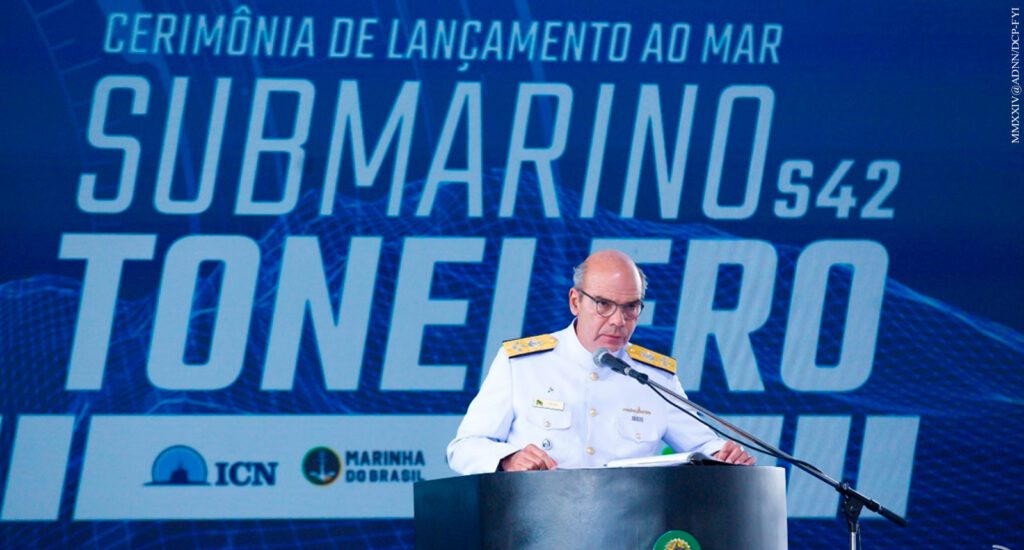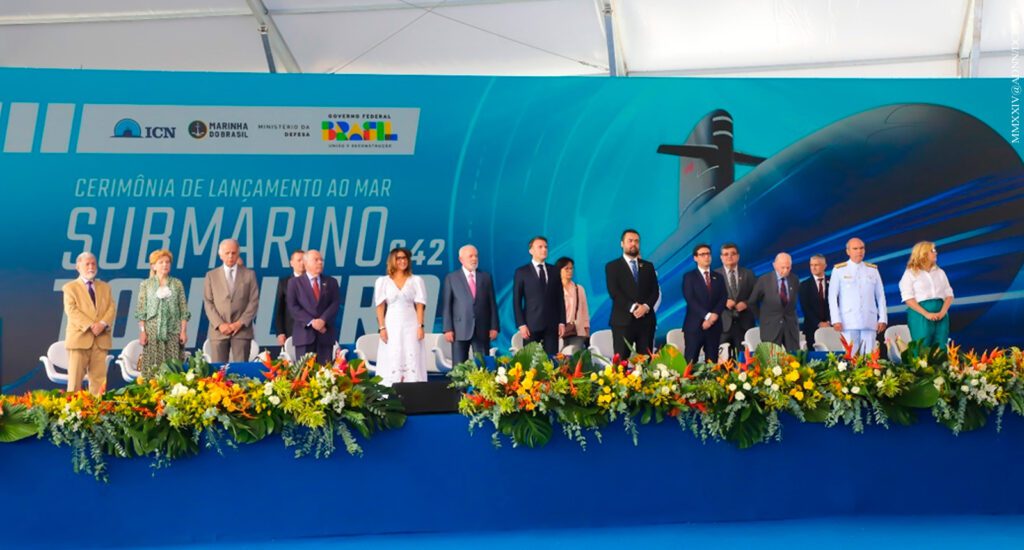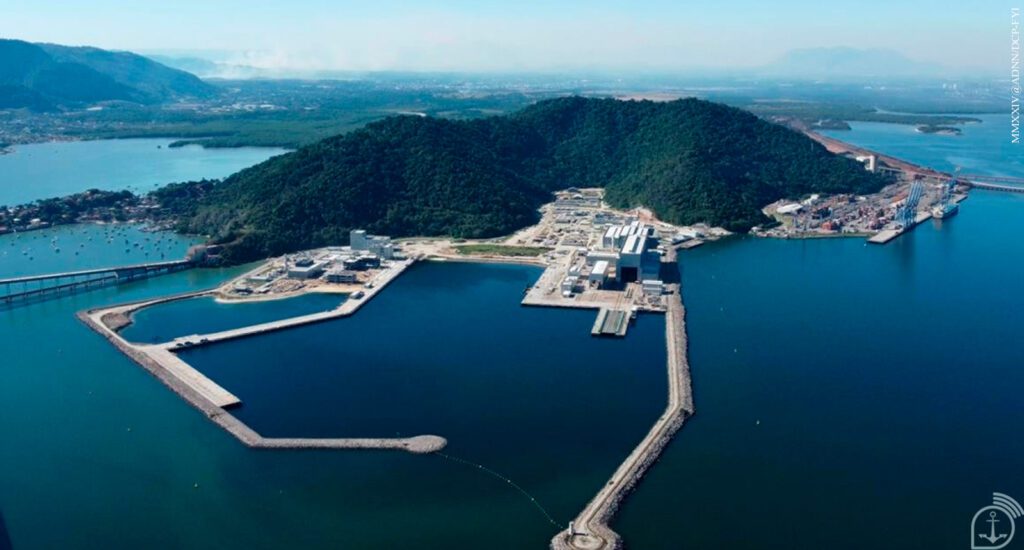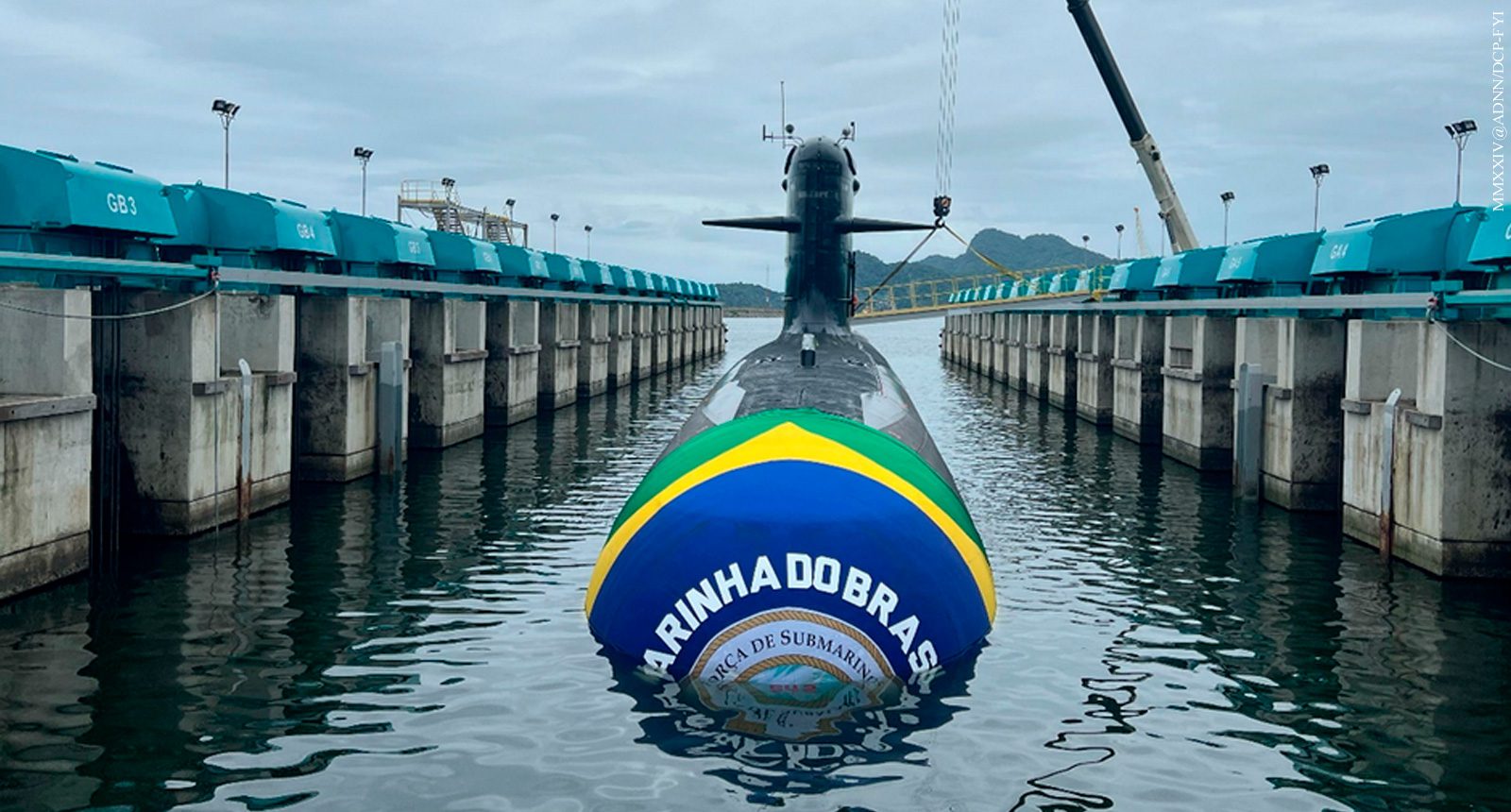This is PROSUB’s third conventional submarine and 100% made in Brazil
By First Lieutenant (T) Ohana Gonçalves, Second Lieutenant (RM2-T) Stilben and Edwaldo Costa – Itaguaí, RJ
The Brazilian Navy (MB) held the christening and launching of the “Tonelero” submarine today (27) at the Itaguaí Naval Complex (RJ). The event marked the completion of the construction process for the third Conventional Diesel-Electric Submarine (S-BR), built entirely in Brazil, as part of the Submarine Development Program (PROSUB), which is the result of a strategic partnership signed in 2008 between Brazil and France, which provides for the transfer of technology in the military-naval area.
The ceremony was attended by the President of the Republic of Brazil, Luiz Inácio Lula da Silva, accompanied by the President of France, Emmanuel Jean-Michel Frédéric Macron, the Minister of Defense, José Mucio Monteiro, the Commander of the Navy, Fleet Admiral Marcos Sampaio Olsen, and other representatives of the Admiralty. Also present were Ministers of State and other authorities, as well as members of the defense industry and the scientific and technological community.
In his speech, President Lula highlighted the 200 years of diplomatic relations between Brazil and France, to be celebrated in 2025, and said that he had set off, together with President Emmanuel Macron, from the heart of the Green Amazon, in Belém (PA), towards another Amazon: the Blue Amazon. “In this shipyard, we have glimpsed the vastness of Brazil’s 5.7 million km² of maritime space, where 95% of foreign trade transits the South Atlantic, and where there are still untapped natural resources and rich biodiversity. From the Blue Amazon, we get 75% of the natural gas and 45% of the fish produced in our country, and the protection of this natural heritage and the maintenance of the South Atlantic as a zone of peace and cooperation are central aspects of Brazilian foreign policy. Over the last 150 years, these national objectives have become a reality with French support,” he celebrated.
President Lula also said that several MB ships were built in France, such as the Battleship “Brasil”, received in 1865, and the Aerodrome Ship “São Paulo”, which was in service between 2000 and 2014. “Today, with the complex installed here in Sepetiba Bay, Brazil is among the small group of countries that dominate submarine construction. PROSUB is Brazil’s largest and most important international cooperation project in defense matters, because it guarantees sovereignty on our coast, strengthens the naval industry, generating jobs and income, and promotes the development of the sector with a lot of innovation,” added the President.

French President Emmanuel Macron highlighted the historic nature of the achievement, saying that the country had named the submarine after a great victory that is engraved in Brazilian memory. “Once again, Tonelero will be synonymous with a Brazilian victory, but a peaceful, industrial, technological one. Unquestionably a victory,” said the French President.
For him, this is an ambition that, in 2008, might have seemed unreasonable, but which has surprised him with its results. “You were right to believe and we were right to support you. This third submarine is concrete evidence of what our countries are capable of achieving together, a true strategic partnership. We have never shared our know-how more than with Brazil, and the positive impacts of this shipyard, in terms of jobs created, vocations raised and associated universities, go beyond what was intended: they will make it possible to multiply its reach on the surface tenfold, far beyond the submarine depths,” he assured.
Defense Minister José Mucio said that the vigorous progress made on the PROSUB projects is “the result of the professionalism and seriousness with which MB, the companies and the universities have positioned themselves since the beginning of the journey. The Minister also said that the launch of the Tonelero Submarine is a delivery from the State to Brazilian society, stating that this segment of the national industry is responsible for approximately 2.9 million formal jobs, as well as accounting for 4.78% of our Gross Domestic Product. “In 2023, authorized exports related to the Defense industry were 127% higher than in 2022, reaching the second best performance since this monitoring began in 2001. It is undeniably clear how promising this segment is,” he concluded.
President Lula also said that several MB ships were built in France, such as the Battleship “Brasil”, received in 1865, and the Aerodrome Ship “São Paulo”, which was in service between 2000 and 2014. “Today, with the complex installed here in Sepetiba Bay, Brazil is among the small group of countries that dominate submarine construction. PROSUB is Brazil’s largest and most important international cooperation project in defense matters, because it guarantees sovereignty on our coast, strengthens the naval industry, generating jobs and income, and promotes the development of the sector with a lot of innovation,” added the President.
French President Emmanuel Macron highlighted the historic nature of the achievement, saying that the country had named the submarine after a great victory that is engraved in Brazilian memory. “Once again, Tonelero will be synonymous with a Brazilian victory, but a peaceful, industrial, technological one. Unquestionably a victory,” said the French President.
For him, this is an ambition that, in 2008, might have seemed unreasonable, but which has surprised him with its results. “You were right to believe and we were right to support you. This third submarine is concrete evidence of what our countries are capable of achieving together, a true strategic partnership. We have never shared our know-how more than with Brazil, and the positive impacts of this shipyard, in terms of jobs created, vocations raised and associated universities, go beyond what was intended: they will make it possible to multiply its reach on the surface tenfold, far beyond the submarine depths,” he assured.
Defense Minister José Mucio said that the vigorous progress made on the PROSUB projects is “the result of the professionalism and seriousness with which MB, the companies and the universities have positioned themselves since the beginning of the journey. The Minister also said that the launch of the Tonelero Submarine is a delivery from the State to Brazilian society, stating that this segment of the national industry is responsible for approximately 2.9 million formal jobs, as well as accounting for 4.78% of our Gross Domestic Product. “In 2023, authorized exports related to the Defense industry were 127% higher than in 2022, reaching the second best performance since this monitoring began in 2001. It is undeniably clear how promising this segment is,” he concluded.

The Commander of the Navy, Admiral Olsen, defended greater investment not only in the national flotilla, but in the Defense industry as a whole, since, according to him, there is a “still timid mentality on the part of Brazilian society, associated with the low perception of threats, which impose budgetary and financial challenges on the execution of PROSUB and the Navy’s Nuclear Program, with the potential for significant damage to scientific research, job creation and decent income”.
Admiral Olsen added that obtaining the Conventionally Nuclear-Powered Submarine is the greatest asset of national defense. It will represent a distinctive increase in Brazil’s deterrence capacity, strengthening national security and sovereignty, allowing Brazil to achieve political and strategic stature commensurate with its greatness.
“Brazil ratifies national and international commitments made in relation to nuclear activities, in strict compliance with constitutional precepts and high-level conditioning documents, such as the Brazilian Nuclear Policy and the National Defense Strategy. For 30 years, the structure of the Navy’s Nuclear Program has been routinely subjected to accounting and control inspections by the Brazilian-Argentine Agency for Accounting and Control of Nuclear Materials and by the International Atomic Energy Agency, with a history of 438 announced and 144 unannounced inspections. All of them, with successful results, confirm the safe use of nuclear materials in peaceful activities,” he said.
The President of Itaguaí Construções Navais (ICN), Renaud Poyet, recalled that in its 14 years of existence, the company has invested in the technical training of its members, preparing and operating a state-of-the-art industrial infrastructure, which has allowed it to move forward effectively and safely to build the submarines. “This trajectory has produced much more than modern submarines. I’m referring to the generation of thousands of direct and indirect jobs, professional training and the development of the economy of a vast region of Rio de Janeiro,” he said.
The Navy’s Director General for Nuclear and Technological Development, Fleet Admiral Petronio Augusto Siqueira de Aguiar, explains that PROSUB is part of the Brazilian Nuclear Program. It is one of Brazil’s main Strategic Defense Programs. “Throughout these 15 years of partnership, the Program has overcome challenges. In addition to National Defense, the Program has the capacity to provide knowledge and benefits in various areas of interest to Brazilian society,” he explains.
Naval tradition
Fulfilling the naval tradition of christening, in order to auspice the protection of the ship and its crew, Brazil’s first lady, Janja Lula da Silva, who was invited to be the ship’s godmother, christened the Submarine “Tonelero”.
Submarines equipped with modern sensors, missiles, torpedoes and mines, as is the case with the new Brazilian submarines built under PROSUB, have a high deterrent capacity because they are lethal weapons that are difficult to locate when submerged. The possibility of the presence of submarines in a maritime area ensures the Denial of Use of the Sea and forces an opposing naval force to mobilize a considerable number of means and efforts to locate and combat these stealthy vessels.
The design of the “Tonelero” incorporates the modernity of the French-designed Scorpène-class vessels, with adaptations and additions to meet the specific needs of MB operations. Larger than the original Scorpène model, the “Tonelero” is over 71 meters long and has a submerged displacement of 1,870 tons. After being placed in the water, the “Tonelero” will undergo a series of sea trials to assess the performance of the platform and the combat system. It will then be incorporated into the Navy and definitively into the Submarine Force, reinforcing the Brazilian Navy’s capacity to counter threats in maritime areas of strategic interest.
PROSUB
In order to protect the Blue Amazon and guarantee Brazilian sovereignty at sea, the Brazilian Navy has sought to invest in the expansion of the Naval Force and the development of the Defense industry. The National Defense Strategy, launched in 2008, established that Brazil should have a “large naval force”, which motivated the design of PROSUB with the construction of four diesel-electric submarines on national territory. As well as modernizing the MB’s submarine force, the programme will enable the country to build its first conventionally nuclear-powered submarine.
Since then, in addition to the “Tonelero”, the “Riachuelo” (S40) and “Humaitá” (S41) submarines have already been delivered. There are still plans to deliver another conventional submarine, the “Angostura” (S43); and the construction of the Brazilian Conventionally Armed Submarine with Nuclear Propulsion, the “Álvaro Alberto”, the main object of PROSUB, which will represent an unprecedented increase in Brazilian Naval Power and, as a result, in National Defense.
Strategic partnership between Brazil and France

The Technology Transfer Agreement signed between France and Brazil allows the country to reach the technological level necessary to master the construction of conventional submarines, with the consequent contribution to the development of a nuclear-powered submarine.
This process involves the transmission of knowledge and technical information in various areas, except the nuclear area. The training and qualification of Brazilian engineers and technicians takes place in Brazil and France, through real services (On the Job Training) and technical assistance from NAVAL GROUP (a French industrial group specializing in the design, development and construction of naval assets) until the end of the Program.
The transfer of technology for the construction of the conventional-S-BR submarines has been taking place since 2010, in the city of Cherbourg, France, where more than 250 engineers and technicians from the Navy and employees from Nuclebrás Equipamentos Pesados and Itaguaí Construções Navais have already been trained.
Conventionally Nuclear-Powered Submarine
Within the scope of PROSUB, the technological development and construction of the first Conventionally Armed Submarine with Nuclear Propulsion (SCPN), the main object of the entire Program, represents different challenges for Brazil. It is a naval vessel that requires high technology and brings together the complexity inherent in the design of a submarine as well as the challenges of developing nuclear technology for the design and manufacture of its reactor and the entire Nuclear Embedded Plant (NEP).
In Iperó (SP), the Brazilian Navy is building the nuclear power generation laboratory, with the main aim of safely validating the operation of the naval propulsion reactor and the various electromechanical and control systems integrated with it.
This laboratory is a unique and unprecedented development project in the country, involving challenges, research and innovation carried out by Brazilians. At the end of the tests, a reactor similar to the one certified will be assembled and installed on the “Álvaro Alberto” submarine, this time at the Itaguaí Naval Complex. The specific facilities and dry docks for the construction and maintenance of nuclear-powered submarines will also be built at the complex. All this national development has the capacity to bring technological advances and benefits to various areas of interest to Brazilian society.
In the context of the Nuclear Fuel Cycle, the mastery of uranium enrichment, achieved in 1988 with 100% Brazilian technology and which has been improved over the years, contributes to the production of equipment for the company Indústrias Nucleares do Brasil.
The participation of universities, research institutes and national industry in the execution of PROSUB activities ensures the dissemination in Brazil of essential knowledge for the nuclear sector. From a social point of view, it contributes to the promotion of benefits in the areas of health, agriculture and food safety, with an emphasis on training technicians and engineers in a sensitive area of knowledge, such as nuclear power.

Benefits for Brazilians
PROSUB has accrued a number of benefits for the country since its creation, such as: generating jobs and income; training skilled labour; technological leverage; nationalization and transfer of technology; and the development of the Defence Industrial Base.
By prioritizing the acquisition of national products and systems throughout the production chain, PROSUB fosters the development of Brazilian industries in the defence area, encompassing sectors such as electronics, mechanics (fine and heavy), electromechanics and chemistry, as well as the naval area. In this way, it contributes to the country’s economic growth, as well as generating 22,000 direct jobs and almost 40,000 indirect jobs.
PROSUB also includes the construction of the Itaguaí Naval Complex, which brings together industrial and support infrastructure for the operation and maintenance of submarines, including shipyards, a naval base and the Metal Structures Manufacturing Unit, as well as testing laboratories for various applications.
As a result of the transfer of technology provided by PROSUB, Brazil will be in the select group of countries that have the capacity to design, build, operate and maintain their own conventional and nuclear-powered submarines. The technological drag provided by the development and improvement of the submarine’s onboard technologies will stimulate not only the Defense area, but also national civilian sectors in the fields of Science, Technology and Innovation. In the long term, Brazil will be able to mitigate its dependence on foreign contributions to its submarine projects, and may even generate opportunities for exporting these technologies.
Source: Agência Marinha de Notícias *** Translated by DEFCONPress FYI Team ***
